On the grounds of the Iowa State Fair, Americans testified to how the 2017 Trump tax cuts made a real difference in their lives and livelihoods. The stories shared at a hearing of the Ways and Means Committee reflected the successful record of those tax policies:
- A $5,000 increase in real median household income, larger than in the previous eight years combined.
- A 16 percent tax cut for people making less than $100,000, while the top 1 percent saw their share of taxes go up.
- Zero corporate inversions, reversing the decades-long trend of American companies moving their headquarters, capital, and jobs overseas.
- Record highs in small business optimism and record lows in poverty and unemployment.
The hearing echoed the thoughts and concerns Ways and Means Republicans have heard in meetings, roundtables, listening sessions, and hearings across the country over the past two years and most recently as part of the work the Committee’s Tax Teams have been doing to lay the foundation for a successful fight against a looming tax hike in 2025. Both President Biden and Vice President Harris have pledged to repeal the Trump tax cuts and impose a $7 trillion tax increase – the largest in U.S. history. In fact, Vice President Harris has promised that on “day one” she would raise taxes on all Americans, including workers, families, farmers, and small businesses already struggling with high prices and interest rates created by the Democrats’ failed economic policies. It would be a continuation of the Biden-Harris tax and spend agenda, whose two-year anniversary of its centerpiece, the Inflation Expansion Act, fell on the day of the State Fair hearing. Instead of reducing prices for families, that law handed $650 billion in special interest tax breaks to the wealthy, well-connected, big banks, billion-dollar companies, and China.
“Every Dollar…Goes Toward Our Children”: Doubled Child Tax Credit Helps Parents
The Trump tax cuts doubled the Child Tax Credit to $2,000, which put more money back into the pockets of working parents to help take care of their children. At the hearing, a mother of three, shared with Ways and Means Committee Chairman Jason Smith (MO-08) how the Child Tax Credit helped her afford educational therapy for her children and a water heater for her family home. In the wake of soaring prices, the credit has become even more important for working families. She later shared that the cost of chicken nuggets to feed her sons, among other things, continues to stretch her family budget.
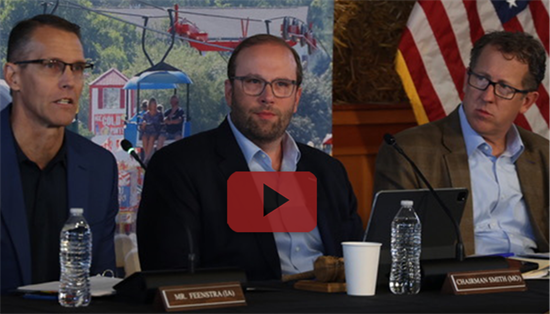
Chairman Smith: “Mrs. Curry, as a mother of three young boys, you know the joys, but also the challenges that can come with raising kids. One policy that I have long championed is the Child Tax Credit. This pro-working family tax policy was created, I like to point out, by a Republican Congress back in 1997 and strengthened by a Republican Congress in the 2017 Trump Tax Cuts. When the Trump Tax Cuts are set to expire at the end of next year, the Child Tax Credit will be slashed in half from $2,000 to $1,000. As a parent, what would that mean to your family, and what more should Congress consider doing with the Child Tax Credit to make it even more helpful to families like yours?”
Sarah Curry, Iowa mother: “Every dollar that my husband and I earn, that we get to keep, goes towards our children. [My son] Isaac, he’s in speech therapy, occupational therapy. We’re waiting for behavioral therapy. It’s all very expensive. Health insurance doesn’t cover everything. [My son] Benjamin needed speech therapy because the little booger didn’t want to talk when he turned two…expenses like that. The water heater goes out; the furnace went out right after Philip was born. Looking at when we file our taxes, it happened early spring, and in Iowa, it’s still very cold then. That was actually a reprieve. I didn’t have to pay a whole lot extra in taxes. We got a little bit back, and it helped with that. Taxes affect my grocery bill. They affect my gas tank. They really do impact my kitchen table.”
Death Tax Is a Death Sentence for Family Farms and Small Businesses
The Trump tax cuts doubled the exemption for the death tax, allowing more families to pass on family farms or small businesses to the next generation. Unfortunately, the higher exemption will expire next year along with many other pro-growth policies. Field hearing host, Rep. Randy Feenstra (IA-04), asked one 2nd generation Iowa manufacturer how the expiration of the Trump tax cuts would hurt the ability to pass the business on to the 3rd and 4th generations. The short answer? “Not possible.”
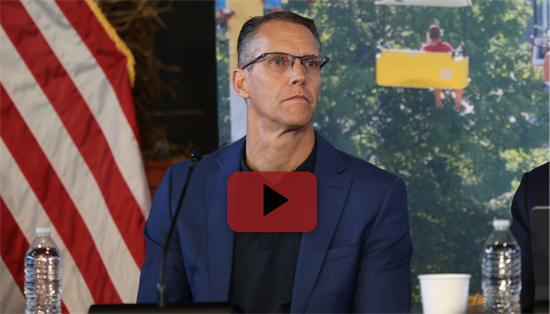
Rep. Feenstra: “We got rid of it [the death tax]in the state of Iowa. I was a big proponent of that, but we haven’t got rid of it at the federal government. I have 170 some members that have signed on to my bill to get rid of the death tax. It’s a pilfer tax. Think about it this way: you collect all this land throughout your life, you die, and all of a sudden, your family members got to pay 42 percent tax on that land. Think about that. 42 percent. That is wrong in so many ways. Mr. Sukup, you’re talking about the third and fourth generation coming down the pipe. How will this affect you if you have to pay that 42 percent?”
Steve Sukup, Iowa manufacturer: “Our third generation is in the office every day. We have six members of our third generation. They enjoy coming to Sheffield, [iowa] every day and working throughout the different jobs of our manufacturing. To be able to pass it on, that would just be overwhelming and not possible.”
“If You Like to Eat, You’ll Help Us With This”: Farmers Speak Up For Pro-Growth Tax Policies
Pro-growth tax policies in the Trump tax cuts, like 100 percent immediate expensing, help farmers afford the equipment needed to operate and turn a profit. These provisions have begun to phase out, making it more difficult for farmers to purchase equipment at the same time that price inflation of feed, fuel, and the equipment itself is squeezing bottom lines. An Iowa farmer shared with Chairman Smith (MO-08) the difficult choices she faced replacing a broken combine now that full expensing is being phased out.
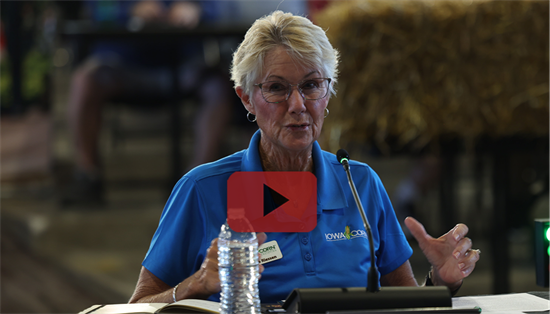
Chairman Smith: “Ms. Riessen, as a family farmer, you know how important it is that your farming equipment is up to date. It’s about delivering the best product to your customers and about keeping your employees safe. I know how important it is to make sure your equipment and tools are up to date and helping you get the most out of your land to deliver goods to market faster, more efficiently, and in greater yields. This investment comes at a tremendous cost, which is why Congress included immediate 100 percent expensing for machines and equipment in the Trump tax cuts back in 2017. However, that provision has already begun to phase out. It was 80 percent last year. It’ll be 60 percent this year, 40 percent next year, and then 20. What has been the impact, and what will the future look like for family farms, like yours, if Congress does not address this critical piece of the tax code?”
Jolene Riessen, Iowa corn farmer: “My first thought is, if you like to eat, you will help us with this. From my experience…our combine last fall was having issues. We looked at it this spring. To fix it was going to be basically $80,000. A combine is worth $120,000. Guess what? We had to get a different combine. If I wanted a brand new one…that’s $750,000 for a 2025 [model]…I ended up buying a $450,000 one. When you buy that piece of equipment, you’re expected to pay it off in three to seven years. That’s usually what the finance is at. Those are pretty hefty bills that come to play. Being able to use that 100 percent depreciation, it freed up money so I can make those payments.”
Lower Corporate Tax Rate Raises Wages
Before the Trump tax cuts, American businesses paid a higher corporate tax rate than even that of Communist China. This disadvantage was glaringly obvious enough that Rep. Adrian Smith (NE-03) noted even former President Obama advocated for a lower corporate tax rate. As a result of the Trump tax cuts, many American companies were able to raise wages and hire new workers here in the United States. A Home Depot executive testified that company employees, including those working on a store floor, received permanent wage increases as a result of those tax cuts that have helped them keep up with inflation.
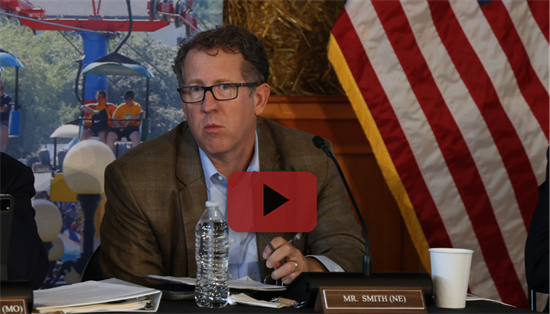
Rep. Smith: “In the run up to the 2017 tax reform, it’s important to note that even Barack Obama realized we were not competitive on the corporate side…As the Chairman pointed out, we were losing American companies to relocation to other tax jurisdiction because it was more favorable…Can you elaborate on what you did with that 21 percent rate?”
Karen Dewalt, Home Depot tax executive: “The decrease in the corporate rate, that was 35 [percent], down to 21 [percent] created an opportunity for us to really double down on investing in our business. We did so with our supply chain expansion, which increased our footprint, created jobs, and helps us to better serve our customers. We also took care of our associates…We increased wages by a billion dollars – permanent wage increase in 2021 and then a second billion dollar wage increase announced last year. Those are permanent. Not bonuses, but wage increases.”
Doubled Standard Deduction Cuts Taxes and Cuts Paperwork
The Trump tax cuts doubled the guaranteed standard deduction, both cutting taxes and simplifying tax filing for low- and middle-income Americans. If these tax cuts are allowed to expire in 2025, American families and workers will either pay more in taxes, or spend precious time organizing receipts, like one mother of three noted to Rep. Nicole Malliotakis (NY-11). The Biden-Harris tax hike that slashes the standard deduction in half would raise federal and state taxes for many Americans.
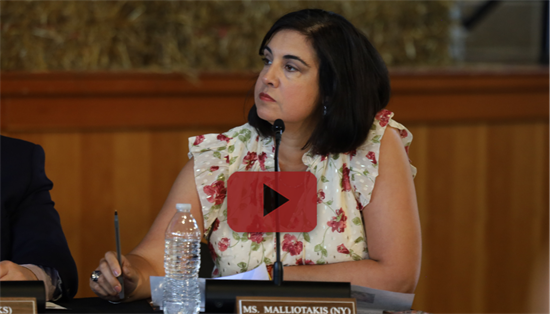
Rep. Malliotakis: “As a family, what would the standard deduction being increased even further mean for a family like yours?”
Sarah Curry, Iowa mother: “First and foremost…reducing the standard deduction would negatively impact my family because it would raise my taxable income both at the federal and the state level. We experienced benefits from tax simplicity. I didn’t have to have receipts all over the floor, trying to itemize all this stuff, trying to save a buck. We were able to take the standard. Iowa and many states use the federal taxable income as the starting point for state tax that is owed. With the reduction in the federal standard deduction, my state taxes will also go up. I’m not going to be hit once with this tax increase; I’m going to get hit multiple times over.”
Rep. Malliotakis: “That’s right. And that’s exactly why I wanted to see the standard deduction not only kept, but enhanced to protect more middle class families, because that’s who really benefits from it. And with that said, the alternative minimum tax, do you have an opinion if that were to be added back?”
Sarah Curry, Iowa mother: “Any tax that’s brought back that is hurting American families and taking more of our earned money away from us, so that we can’t spend it on our families and invest in our homes and our children is a bad thing.”
Small Business Deduction Critical for Main Street America
The Trump tax cuts created a 20 percent deduction for small businesses that has helped Main Street businesses expand, hire more employees, and invest more in their communities. If this provision expires, small businesses could face a 43.4 percent tax rate limiting their ability to invest, expand, and prosper as one small business owner testified in response to Rep. Claudia Tenney (NY-24).
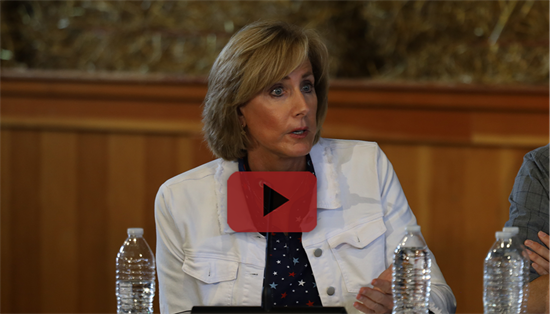
Rep. Tenney: “Most of the businesses, as Ms. Pol said, in our communities are driven by small business owners, including our farmers. And so, we are just grateful to all of you for putting it in your words exactly what the catastrophic results could be if we don’t continue with these issues… But you talked about 199A, if it should expire, could you tell me just briefly what the operational changes you would have to make in the business if that were to happen?”
Lana Pol, small business owner: “Well, currently, I think what we would do is stop investing, you know. We wouldn’t be able to expense the equipment, you know. We wouldn’t have the extra money to reinvest into our employees and anything else that we wanted to pursue.”
